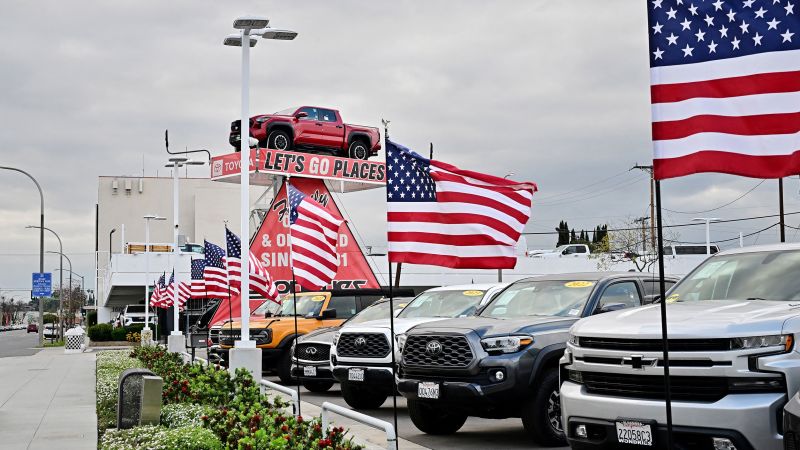CNN
—
Auto dealerships across the United States could see a jump in customer traffic this week as cost-conscious buyers look to avoid a possible uptick in prices and maintenance costs over the next few years, according to industry analysts.
The growing concern over sticker shock has one cause: President Donald Trump’s 25% tariffs on imported vehicles and parts, which are expected to take effect Thursday. The tariffs will likely impact the cost of cars built in American factories, too, by thousands of dollars. That’s because there is no such thing as an all-American car. All 10.2 million cars built in US factories last year were built with a significant number of imported parts, mainly from Canada and Mexico.
After a surge in car-buying, auto sales can expect to drop while new and used car prices increase, and some models will be eliminated, according to Cox Automotives.
“We have seen this movie before. During COVID, supply became constrained, costs skyrocketed. While the increase in prices this time may be for completely different reasons, it still stands to reason that the market will not bear another significant increase,” Erin Keating, executive analyst at Cox, said Friday in a note.
The cost of a car assembled in North America — such as a Ford, Chrysler, GM or Honda — could increase between $4,000 and $10,000, according to a February estimate from Michigan-based think tank Anderson Economic Group. The price of an electric vehicle, meanwhile, could cost at least $12,000 more.
Miguel Colom, a resident of Bethlehem, Pennsylvania, told CNN that he and his wife plan to buy a Chevy Equinox EV but have felt rushed to make a purchase before May because of the looming tariffs.
“A $12,500 price increase on the vehicle we chose would effectively remove it from consideration, pushing us to make a purchase decision with less financial runway than we had hoped,” he said in an email to CNN. Colom added that he and his wife would be hesitant to buy a new car even if there was a modest price increase.
While one concern has been the price of the cars themselves, the cost of maintenance for older car models has worried some Americans.
Robert Wyatt of New Jersey told CNN he traded in his 9-year-old car, a Mercedes GLE-350, for a new Toyota. He initially planned to buy a car within the next two years but bought it sooner because of Trump’s tariff plans.
“Things start breaking,” he said about his previous vehicle. “I was afraid of that maintenance. With a new vehicle it’s gonna be a couple of years before repairs.”
Sales managers told CNN that they have been fielding more inquiries, though there hasn’t been a dramatic jump in sales just yet. Tom Tatich, the general manager at a Toyota dealership in Marysville, Washington, said customers are uneasy about how car prices will look down the road.
Tatich says high demand and a limited supply have been an ongoing issue at Toyota. He believes the demand will remain consistent once tariffs take effect and says customers have tried to lock in prices for cars yet to arrive.
“There are people wanting to ensure the prices quoted on inbound cars won’t change,” he explained.
A lack of reassurances from Trump has done little to ease uncertainty. On Saturday, Trump told NBC News’ Kristen Welker in a phone interview that he encourages price increases on foreign cars because “if the prices on foreign cars go up, they’re going to buy American cars.”
Automakers are more likely to cut back on production while they wait to see whether Trump’s tariffs will stick, which would then lead to inventory declines. With a lower supply, dealerships will raise their prices in the coming months. There are also industry concerns about a decline in the number of customers.
Trump has repeatedly floated tariff proposals since taking office, with the first slate on Canada and Mexico initially planned for early February — only to be delayed a month into March, and again into early April. He later announced the new 25% tariffs on all car imports and car parts, such as engines and transmissions.
Although Trump has said he won’t delay tariffs again for automakers, he could change his mind before or after tariffs take effect. Automakers tiptoeing around that uncertainty by delaying production and buyers who hold on to their vehicles by taking a wait-and-see approach to tariffs means reduced supply and increased prices.
In Wisconsin, Doug Schoepp, owner of Schoepp Motors, said his dealership has about 500 available cars, which should last two to three months. He told CNN he is unsure whether Trump’s tariff policies will be confirmed Thursday or if the president will loosen up on his promises. If tariffs remain, everyone will pay more, Schoepp added.
“The car business will definitely hurt if the tariffs go in place. If (Trump) sticks to his guns, yeah, new cars could go up as much as 25%. Used cars will go up 10% at minimum,” Schoepp said.

